Christian communities in the Holy Land
Catholics in Jerusalem and Bethlehem participate in processions, celebrations, and liturgy.
BETHLEHEM, WEST BANK – The escalating conflict between Israel and the Palestinian territories often brings focus on the tensions between Judaism and Islam, the two majority religions in the region.
However, the ongoing war and its sociopolitical ramifications threaten to further smother the already dwindling Christian presence on both sides of a broken Holy Land.
Fox News Digital traveled across Israel and the Palestinian territories to speak with Christian leaders who are fighting to keep the faith alive in the face of political, financial and violent threats to its very existence.
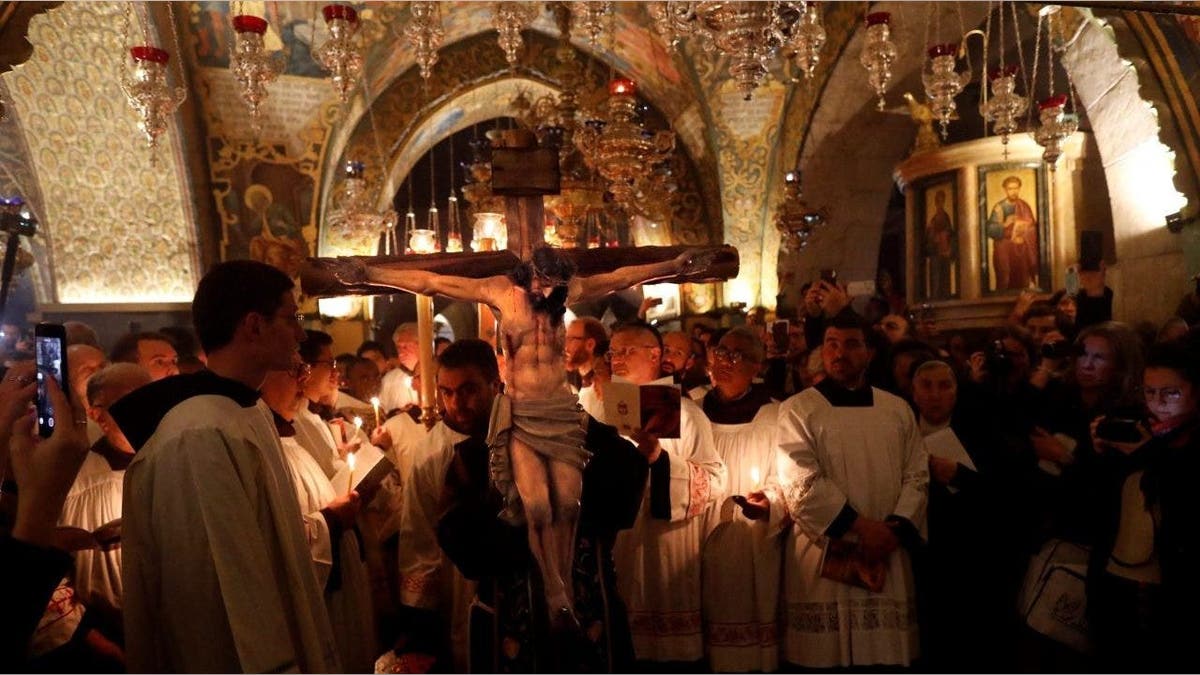
Franciscan friars walk with a statue of Jesus during a reenactment of the Funeral of Jesus at the Calvary (Golgotha) inside the Church of the Holy Sepulchre during Good Friday in the Old City of Jerusalem. (THOMAS COEX/AFP via Getty Images)
Christians of all denominations together make up only 2% of the entire population in Israel and the Palestinian territories. Approximately three-quarters of Christians in the region are Arab and tend to belong to ancient, apostolic denominations such as the Greek Orthodox, Coptic and Catholic churches.
If one superimposes modern geopolitical borders over a map showing the route Jesus Christ took throughout the Biblical narrative, it shows that the messiah's birth, ministry, death and resurrection are not confined to either Israel or the Palestinian territories.
While Christians in the Holy Land may have Israeli or Palestinian passports, their faith does not align itself exclusively with either government. Nor is either government particularly sympathetic to the Christian mission of evangelization and custody of sacred sites within their borders.
Priests and lay leaders in the Catholic Church – the largest denomination in the Holy Land – are not uniform in their thoughts about the conflict and the path forward for their church. But it's universally understood that the current situation cannot continue for much longer without severe harm to Christian witnesses in the land where Jesus walked.
‘Into the deep’
Eamon Kelly, an Irish priest in the Legionnaires of Christ, is the vice director of the Magdala Hotel, a lodging for pilgrims built on the banks of the Sea of Galilee.
In addition to beautiful accommodations and a bespoke church constructed to convey the significance of the sea within the Biblical narrative, it is also the site of an archaeological dig that has uncovered a synagogue dating back to the first century AD.

The altar of the Magdala Hotel's "Duc in Altum" church and worship space is designed to mimic a boat and aligned with the horizon of the Sea of Galilee to appear as if it was floating. "Duc in Altum" is Latin for "put out into the deep," a command Jesus gave St. Peter before a miraculous catch of fish. (Magdala Hotel)
Since the Oct. 7 massacre committed by Hamas last year, the Magdala Hotel has been housing Israeli families displaced by the carnage. Providing shelter for victims of the conflict has given Kelly a wider perspective on the Christian mission in the Holy Land, one that goes beyond dissecting demographics and institutions.
"Usually the narratives focus on the heart of a certain group, a certain subsection of humanity under a particular category," Kelly told Fox News Digital. "And what happens actually in Magdala, before anything religious happens, is the appeal to the human dignity as such, that we are all made in the image and likeness of the Almighty."
The massacre and the subsequent retaliation from the Israeli government dashed long-growing hopes that radicalism and terrorist occupation of entire swaths of Palestinian territory was slowly being tempered and brought under control.
"October 7th [woke] a lot of people up to realize, well, the situation is not under control. And so there's a lot of deep hurt and deep frustration, deep disappointment," Kelly continued. "And so you're meeting people – no matter where they're from, what background they're from – that are bearing the burden of this. And that breaks their hope for the future. And so [that's] probably one of the biggest ministries."
Kelly spends his days managing the Magdala Hotel, providing tours of the archaeological digs for guests, saying Mass in the onsite church and generally being a friend or pastor to anyone in need.
The Irish priest, who has described himself as "only a teenager in the Holy Land" after living there for 17 years, does not pretend that peace and goodwill is going to manifest overnight between Israelis and Palestinians, much less between the Israeli government and the terrorist group Hamas.
But Kelly suggests that Christians are differentiated from activists for "national goals" because they don't care about "desires and ambitions" for specific political change but instead a unique witness to universal dignity.
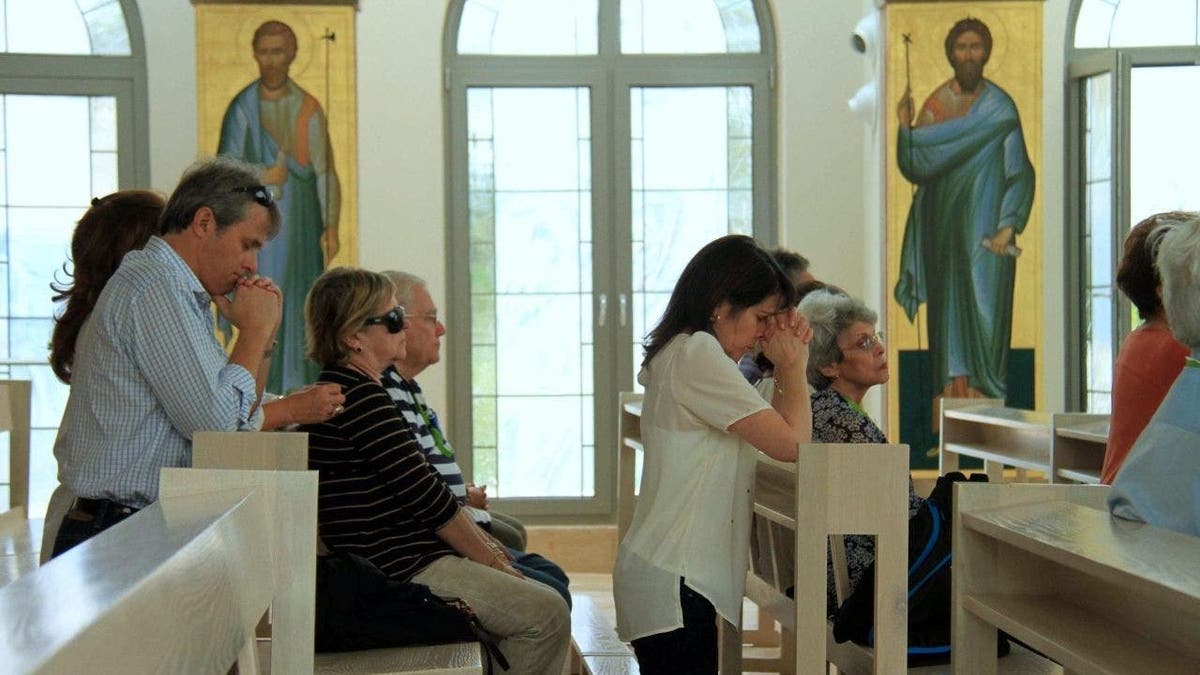
Worshipers pray and reflect in the Duc in Altum Church at the Magdala Hotel, a lodging intended for Christian pilgrims visiting the Sea of Galilee. It is operated by priests of the Legionaries of Christ and is the site of an archaeological dig that uncovered a synagogue from the first century. (Magdala Hotel)
"There, negotiation is a key word. But for a person that belongs to a kingdom not of this world but that is present in the world, I think the issue is to strengthen people," Kelly told Fox News Digital. "First of all, in the basic strength to not yield to despair and discouragement, because by yielding to despair and discouragement, there's no future for anything."
Kelly draws sacred inspiration from the Biblical narrative of Jesus approaching St. Peter (then named Simon) on the banks of the Sea of Galilee, urging him to "go out into the deep" before the miraculous manifestation of countless fish.
The "deep" that Kelly is urging people to plunge into is not water but a vicious emotional turmoil that tests the human capacity for mercy and forgiveness despite cynical criticism that such reconciliations are impossible.
"It is a major defining theme of Christianity. And the question that I personally find myself asking is: ‘Can we demand people to be merciful? Can we expect people [to be] merciful?’ Well, I think we could," Kelly said. "When we are looking at Christians, we should expect Christians as part of our identity to have this part in our thoughts and our interactions."
Choosing sides
Not all Christians are apolitical; some actively seek cooperation with national governments as protectors from what they perceive as much worse alternatives.
Shadi Khalloul is an Israeli citizen of Lebanese heritage also living near the Sea of Galilee.
As the president and founder of the Aram Christian Galilee Center, he has long advocated for Christian communities to embrace assimilation into Israeli society as a means of sustainable growth and safety.
LATIN PATRIARCH SAYS PHOTOS SHOW BOMBED GAZA CONVENT AS WHITE HOUSE RAISES 'CONCERNS' WITH IDF
He was inspired to work on behalf of his community after studying abroad in the United States and attending a class on the Bible as literature.
As the class dissected the words of Jesus in the original Aramaic, a professor referred to it as a "dead language." This statement deeply upset Khalloul, as his Maronite Catholic Church still worships in Aramaic and sometimes uses it in day-to-day life.
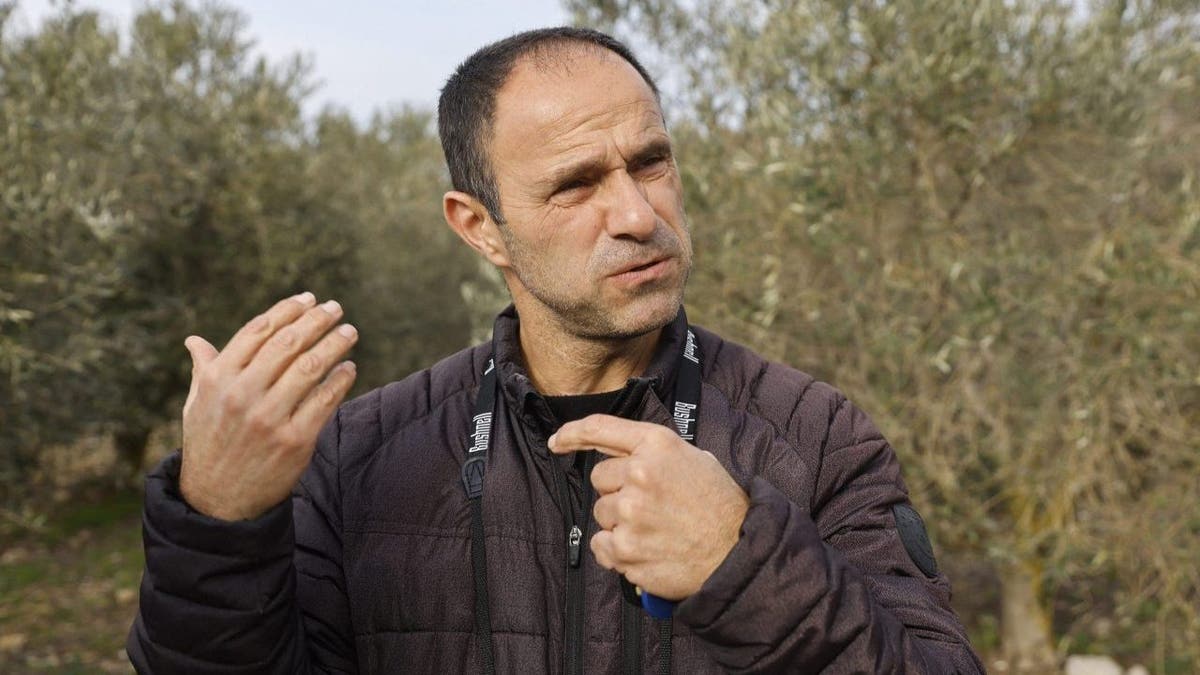
Shadi Khalloul, the president and founder of the Aram Christian Galilee Center, speaks at his village of Jish in northern Israel near the Lebanon border. (JALAA MAREY/AFP via Getty Images)
This experience led him to dedicate his life to ensuring his Aramaic-speaking Maronite community would not only continue to exist but thrive and grow.
For Khalloul, that means embracing Israeli nationalism and the protections a first-world democratic country can provide.
"Most Christians are for the 'live and let others live' mentality, the same as many Jews here. We accept and defend Israel and Jewish democracy. We enjoy it better than living under any other Arab regimes," Khalloul told Fox News Digital. "But we are realistic, too, and know that Islamic nations can't allow this method to exist. They [seek to] control while others need to live under their Islamic Sharia laws as [non-Muslim subjects] with lack of basic human rights. We understand it."
Khalloul is hawkish on ending the conflict and is an outspoken advocate for imposing Western ideologies onto the Islamic world.
"The West must spread their ideology and values in the Islamic world and have equal rights [as Muslims do] in Western countries," he told Fox News Digital. "I'm sure if this happens, the Muslim world will change because the nature of people would go towards life and not follow the culture of death represented by these radical Islamic brotherhood movements."
Many individual Christians are proud citizens of Israel and even serve in the nation's armed forces. This is the relationship that Khalloul wants to foster. To him, service in the Israel Defense Forces is a key method of integration for Christians.
However, Israel's overarching relationship with its Christian demographics and their leadership is currently far from collaborative.
POPE FRANCIS ALLEGEDLY REPEATS ANTI-GAY SLUR WHILE DISCUSSING BAN ON HOMOSEXUAL SEMINARIANS
The price of doing business
Multiple Israeli municipalities initiated tax proceedings against Christian churches this week, outraging religious prelates who called it a "coordinated attack."
The municipalities of Jerusalem, Nazareth, Tel Aviv and Ramla are reportedly demanding decades-worth of alleged back taxes from Catholic, Orthodox and Coptic church leaders and seeking to end long-established exemptions for Christian real estate holdings that are not directly used for worship.
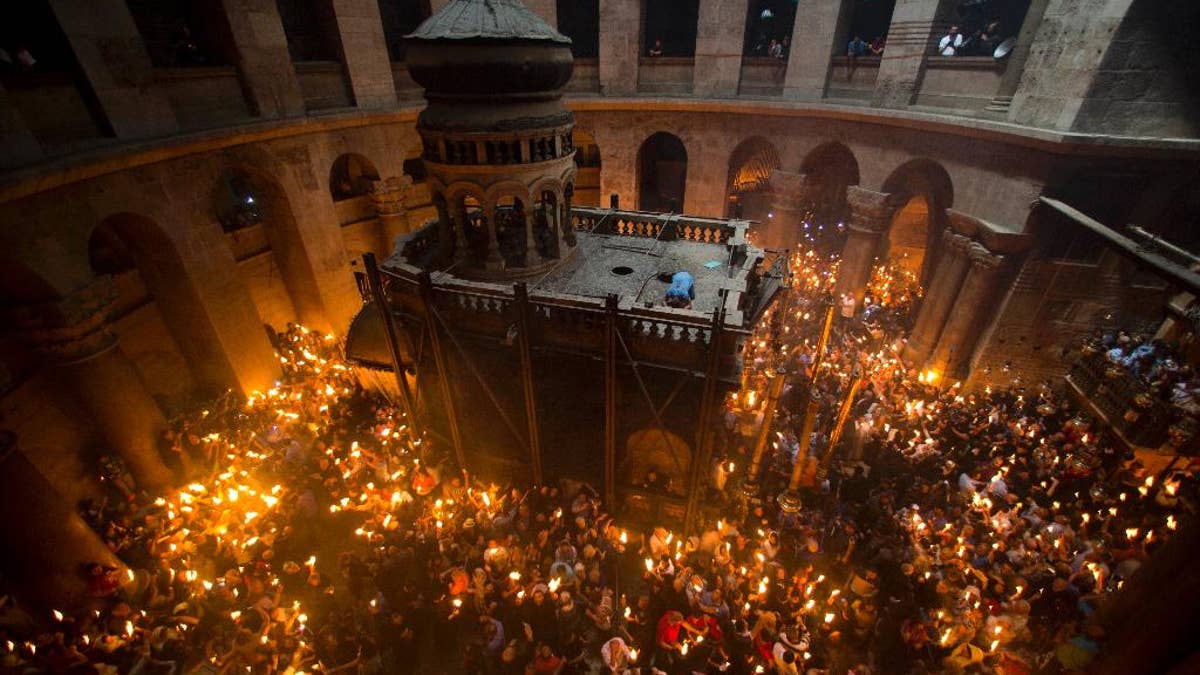
Christian Orthodox pilgrims hold candles during the Holy Fire ceremony in the Church of the Holy Sepulchre, traditionally believed to be the burial site of Jesus Christ, in Jerusalem. (Associated Press)
Christian prelates argue that churches' commercial and real estate holdings are used to provide health care, education, housing and other resources to underprivileged communities.
The heads of the Catholic, Greek Orthodox and Armenian Orthodox churches in the Holy Land wrote a letter in response to these demands, accusing the Israeli government of attempting to push Christians out of the Holy Land.
"We believe these efforts represent a coordinated attack on the Christian presence in the Holy Land," the church leaders wrote in the letter.
They continued, "In this time, when the whole world, and the Christian world in particular, are constantly following the events in Israel, we find ourselves, once again, dealing with an attempt by authorities to drive the Christian presence out of the Holy Land."
POPE AFFIRMS ISRAEL HAS 'RIGHT' TO 'DEFEND THEMSELVES,' MOURNS INNOCENTS IN GAZA
In 2018, Christian leaders were faced with similar threats from the Israeli government challenging tax exemptions on church-owned properties not used for worship.
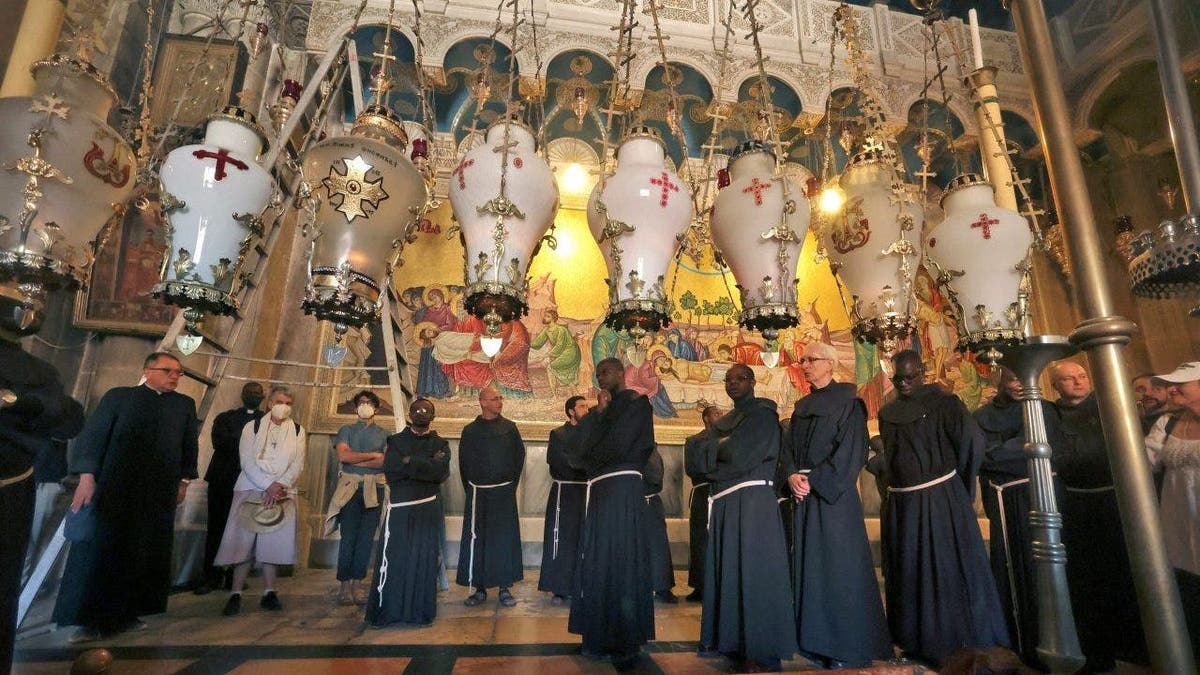
Franciscan friars join believers in prayer at the Church of the Holy Sepulchre, during the Good Friday procession in Jerusalem's Old City. (HAZEM BADER/AFP via Getty Images)
In response, the heads of six different churches in the Holy Land made the coordinated decision to close the Church of the Holy Sepulchre – identified as the site of Jesus's crucifixion and resurrection – in protest of existential concerns.
Then-Mayor of Jerusalem Nir Barkat eventually backed down after the Holy Sepulchre's closure rallied Christian outrage in opposition to proposed taxes.
Christian leaders will not have the same leverage in the latest tax battle as Christian pilgrims and tourists have all but evaporated from the area due to the Israel-Hamas conflict.
Praying for enemies
Less than 30 minutes from Jerusalem, separated by a security checkpoint and miles of concrete walls, sits Bethlehem, the birthplace of Jesus Christ.
Approximately 11% of the city's population is Christian, the highest in the Holy Land. But hat statistic is plummeting, down from over 85% in 1947.
Bethlehem is home to one of the most sacred locations in all of Christianity: the Church of the Nativity, which was built to mark the spot where Jesus is believed to have entered the world.
It was constructed in the 4th century by Helena, the mother of Constantine the Great. It is currently in the shared custody of the Greek Orthodox, Catholic and Armenian Orthodox churches.
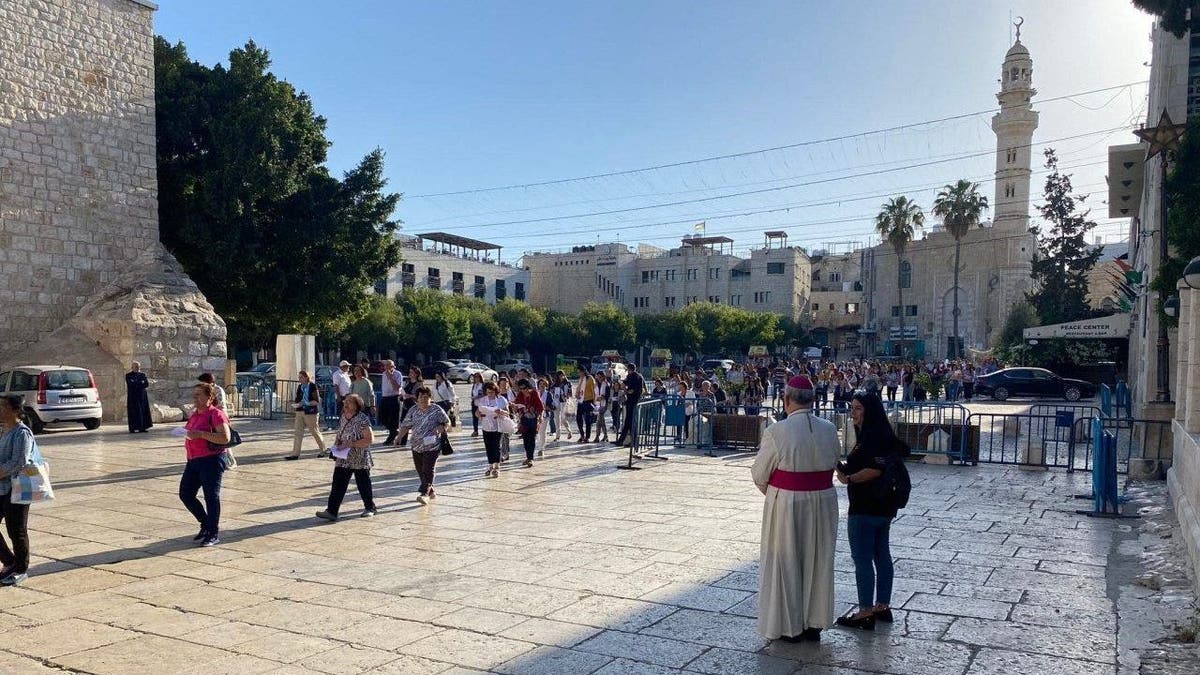
A Catholic bishop watches as a church procession passes through the city of Bethlehem in the West Bank and enters the Church of the Nativity. (Timothy Nerozzi)
The church and the city's religious significance once made Bethlehem a thriving tourist and pilgrimage destination for Christians from around the world. The town has seen a near total collapse of the industry since the latest conflict between Israel and Hamas began in the Gaza Strip. Having just begun to recover from the coronavirus pandemic shutdowns, this stagnation is like a death sentence for the community.
As the economy has disintegrated, Christian flight from Bethlehem has rapidly accelerated the collapse of the faith's presence in Jesus's hometown as many choose to flee where their families can make a living, if they are even able to leave.
Rami Asakrieh is a Franciscan friar in Bethlehem who serves Catholics at the Church of the Nativity. He has seen firsthand the widespread anguish overtaking the West Bank and his city in particular.
"If you lose the Christian community, or if the good people emigrate because of this instability – politically and economically – this means that we will lose a good part, an important part, of the identity of the holy places," Rami told Fox News Digital. "Because the holy places need the people who live here who are animated with their prayers, with their activities, with their pastoral activities, with their presence and with their effort to the society to keep it to having Christian charity."
"Our brothers in Islam and the Hebrew Israelis are numerous, but the Christians, all together, I think they are at about 60,000 [in Bethlehem]," Rami said. "Anybody who has the chance will go. Even in this last war, even Israelis with American passports left."
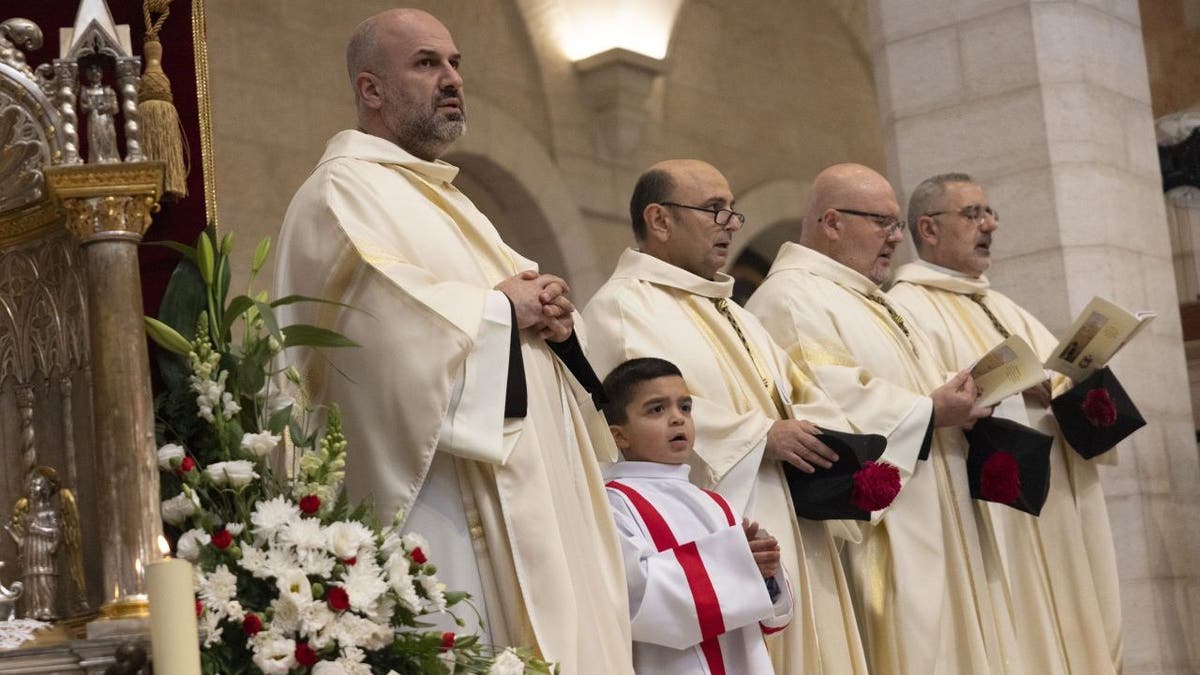
Rami Asakrieh, left, celebrates Mass at Saint Catherine's Church in the Church of the Nativity in Bethlehem. (Maja Hitij/Getty Images)
Rami is a sharp critic of Israel's treatment of Palestinians who are not involved in the terrorist organizations that led to Oct. 7.
While he acknowledges that Christians in Israel may see better opportunity within its borders, he argues that peaceful Palestinians seeking to carve out a future in the West Bank have been held back by Israeli policies that drive them into poverty and disrupt society.
"Christianity tells us that everybody is created in the image of God and deserves to live with liberty, with freedom, with independence, to have their rights," Rami said.
"We don't know what will happen with [the Palestinian territory] if they are an independent country, if they have a real government," he told Fox News Digital. "There is no comparison between Israel and [the Palestinian territory] now because for 76 years [it] has been suffering. There is no independence, there is not really a government because of the conflict with Israel, but Israel has all the money, has all the government, has all the freedom and the army to build itself."
Rami told Fox News Digital that many Americans' enthusiastic support for Israeli military supremacy is often attributable to Third Temple theology: the belief in some Protestant denominations that a third Jewish temple will be built in Jerusalem prior to the return of Christ.
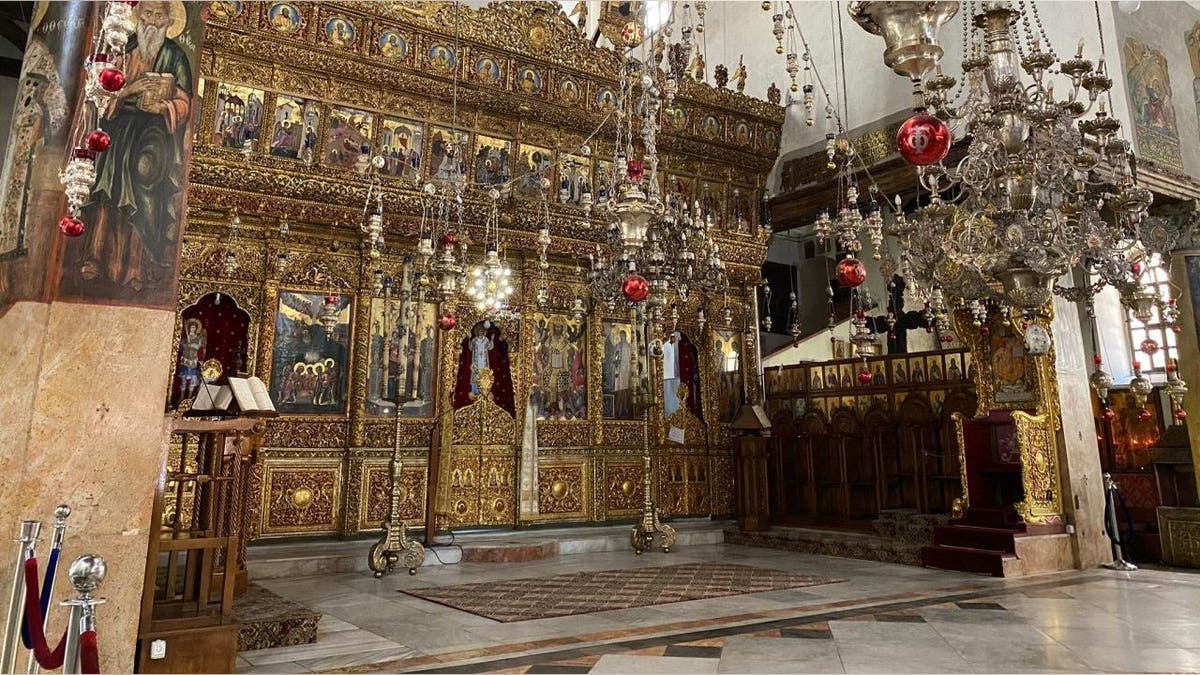
This picture, taken inside the Church of the Nativity in Bethlehem, shows the main altar of the church. Greek Orthodox, Catholic and Armenian Orthodox services are held at the pilgrimage site. (Timothy Nerozzi)
The Bethlehem priest warned that conflating the state of Israel with this evangelical theology is causing confusion about the nature of the conflict and threatens to only instigate further bloodshed.
What Rami says he wants most is peace: "When you say about yourself that you are Christian and you go in the political view that [...] you are supporting the war, supporting the weapons and guided by religious ideas, saying this is biblical; it's similar to the time of the Crusades, when some superior in the church went with the politicians' view, was guided by [outside] interests."
"So, this is what we have now in the evangelical churches, from my point of view, and they need to open their mind to the Bible," he told Fox News Digital. "The spirit of the Bible is all about love. Love everybody, even praying for enemies, and this is the word of Jesus."
He continued, "So, if you are talking about some beautiful idea – the Temple – how this temple will happen, they need to ask more. And they will discover it is by destroying other religions, important places for other religions, in the war. And this is what they are supporting in an indirect way."
Rami emphasized a need for radical belief in the universal humanity of all people as the first step in ending the divisions between Israelis and Palestinians.
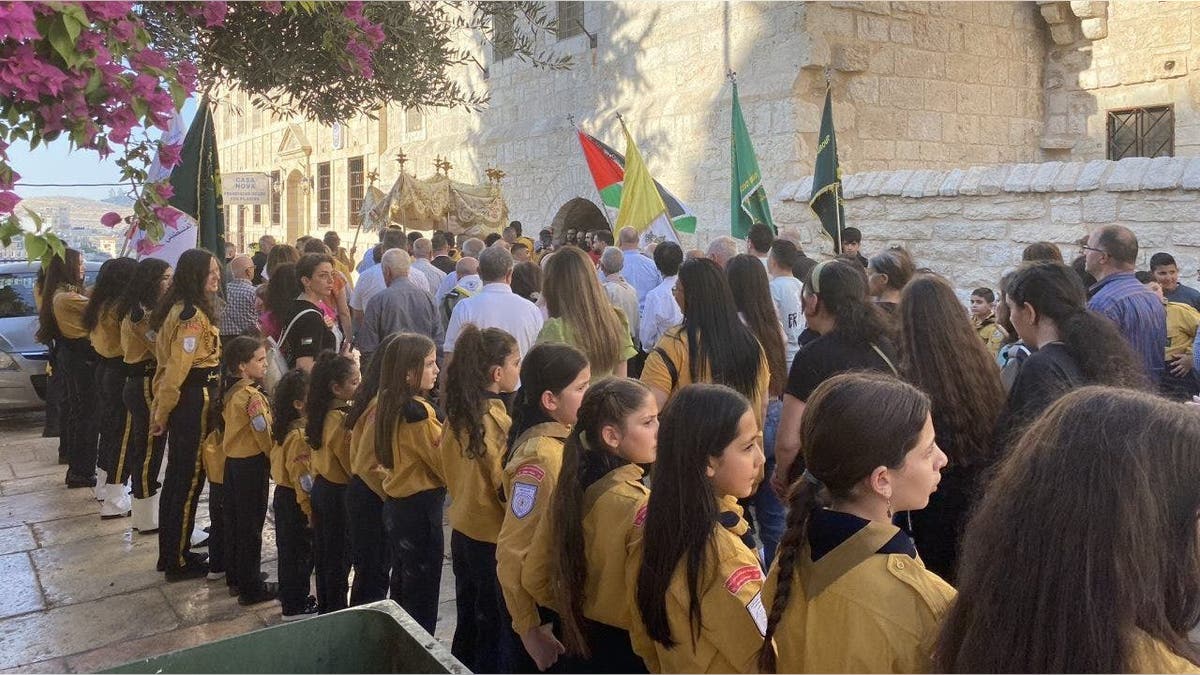
Palestinian children involved with the Scouting movement participate in an honor guard for a Eucharistic procession outside the Church of the Nativity in Bethlehem. (Timothy Nerozzi)
"First, believe that we are equal, that we are created in the image of God," Rami said. "I'm not talking about interpretation. I'm talking about the real books that all say that God created humanity in his own image."
"And from that, the church teaching is that everybody has inside of him some touch of our God, some touch of the beauty and goodness and love of our God," Rami continued. "People want to avoid that, they say that you don't have a right to live."
The Franciscan said this principal of forgiveness must even extend to bitter enemies who might have committed horrific crimes, because to fail to forgive is to lose one's own humanity.
"People will tell you that 'If you kill my brother, I will be full of revenge.' If I don't have some faith to help me get back my humanity and to forgive, it is normal that I will tell you, ‘I will kill everyone who killed my brother,’" Rami said.
CLICK HERE TO GET THE FOX NEWS APP
"You cannot say, ‘Because we are Christians, we are distinguished from others.’ We have victims because of the war. Israelis are victims and Muslims are victims. So, the war is bad for everybody," Rami concluded. "So, I hope there is a little bit of [intelligence] and humanity that the presidents of the world start to have. Because supporting war, that means stupidity and losing humanity and supporting killing."
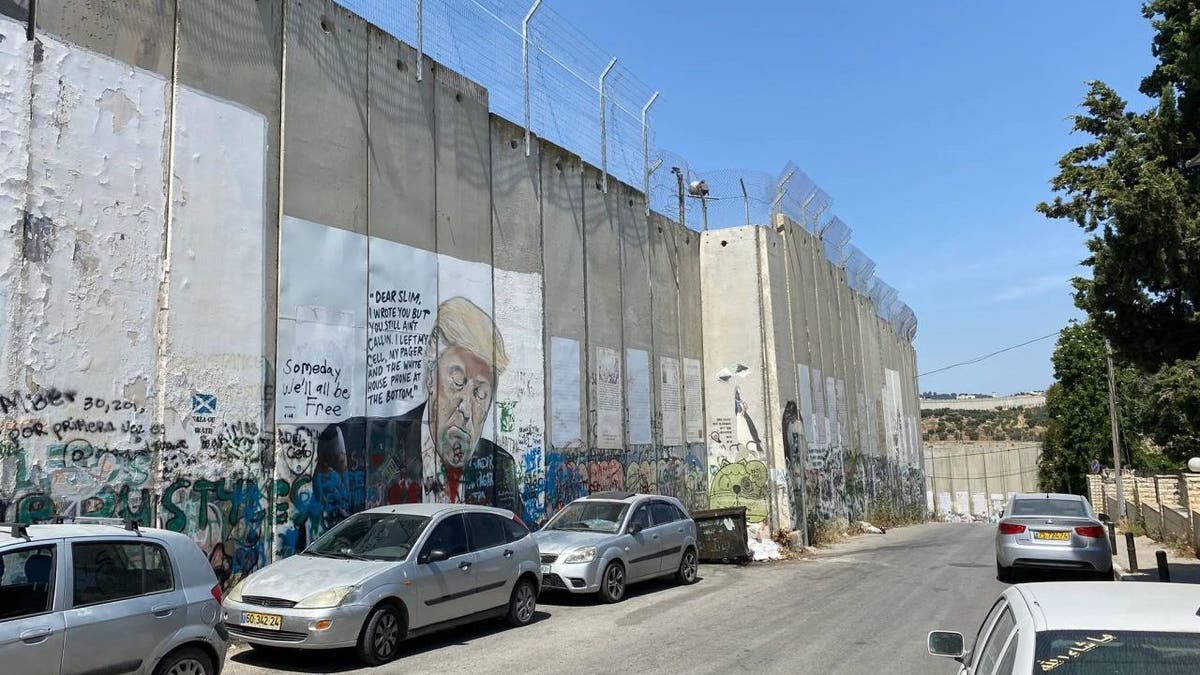
The barrier wall enclosing Bethlehem and separating the West Bank from the rest of Israel is seen covered in protest graffiti. (Timothy Nerozzi)
The Kingdom of God is Ethereal
Without their own territories and with virtually zero representation in national politics, the Catholic Church's pleas for peace
Fox News Digital spoke with Ambassador Michèle Burke Bowe, a diplomat of the Sovereign Military Hospitaller Order of Saint John of Jerusalem, of Rhodes and of Malta (commonly referred to as the Order of Malta), about how the Catholic Church's lack of effective political power may be a blessing in disguise.
Bowe serves as the Head of the Representative Office to the State of Palestine for the Order of Malta. Her work focuses mainly on Holy Family Hospital, a world-class maternity hospital in Bethlehem that serves pregnant women of all backgrounds and faiths, whether they are able to pay for care or not.
She performs her job without a salary and usually pays for her own travel out of pocket, as do most ambassadors of the order.
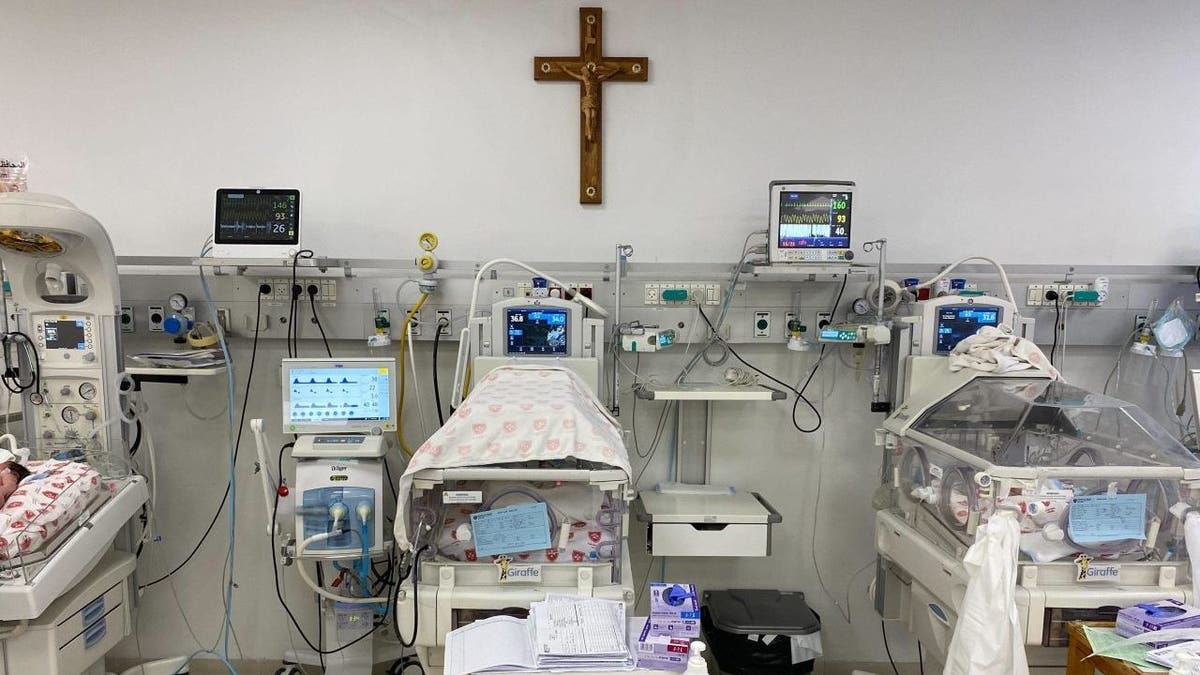
Underweight newborn babies are monitored and cared for in incubators at the Holy Family Hospital NICU in Bethlehem. (Timothy Nerozzi)
"[The Catholic Church] doesn't have the protection of a state or constitution. It just exists because it's always existed, as it always existed, you know, for 2,000 years," she told Fox News Digital. "And it's not looking for economic gain or political power. It's just looking to provide a safe place to worship and a way to relieve suffering."
In this way, Bowe argues that the Catholic Church and its believers cease being a simple minority population and instead become spiritual missionaries outside the secular conflict, witnesses that must be guarded.
"[The Church] is so ethereal. It's really sort of part of the kingdom of God as opposed to being a super minority in the state of Israel," Bowe said. "Yet at the same time, the Church has to be able to help individual Christians maintain their presence, which requires both economic support and protection."
Whether the conflict between the IDF and Hamas ends in a cease-fire or a total occupation of Gaza, the struggles of Christians across Israel and the Palestinian territories are far from over.
Missionaries and charity workers are fighting against overwhelming odds to continue the Catholic Church's humanitarian work in the Holy Land.
Unless a sustainable and earnest effort is made on all sides to give room for Christian flourishing, there may soon come a day when there's hardly any Christians left in the cities where Jesus preached to their ancestors 2,000 years ago.
Quotations in this piece have been lightly edited for clarity.

